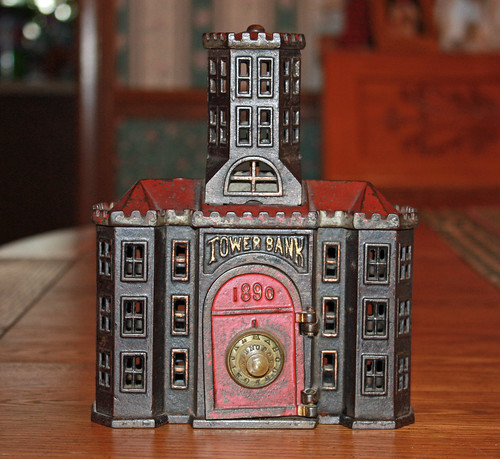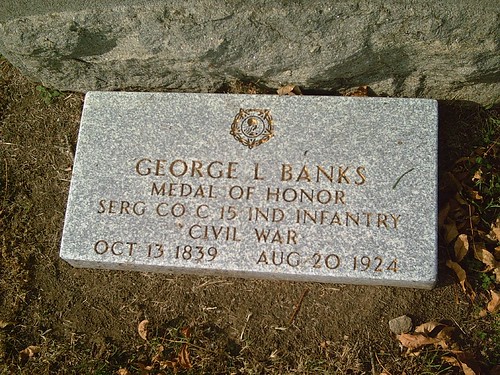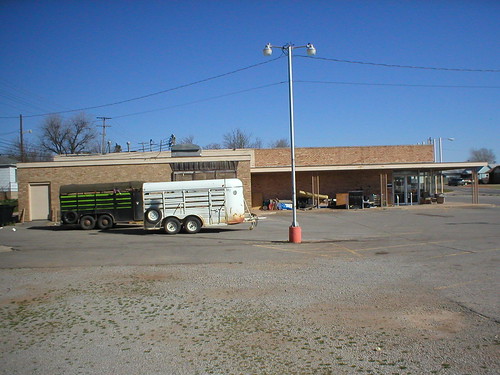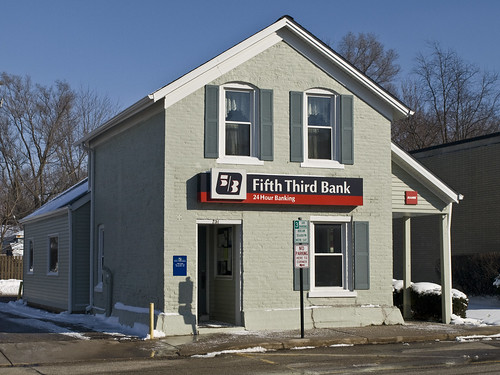012/365 | Tower Bank (1890) | Project 365/2010
Image by myoldpostcards
Pictured above is a cast-iron bank purchased by my paternal great-grandfather for his infant daughter (my grandmother) in the year 1890. This was my grandmother's piggy bank during her childhood and, during the 1950s, was my favorite toy to play with when visiting my grandparents' apartment.
In my pretend world, grandma's bank was at the center of epic battles between armies of toy soldiers. After the soldiers were placed, each side (and, as an only child, I always played both sides) traded turns that consisted of rolling Chicago Transit Authority bus tokens across a wooden floor while attempting to knock over as many soldiers as possible. Getting a bus token to roll across a wooden floor was not difficult, but aiming the roll of a token toward a specific target was a challenge. So when grandma wasn't looking, I'd begin to lob the tokens until the resonance of their dropping on the wood caught her attention, and earned a gentle admonishment.
On the front door of the bank is a combination lock. When the melee was over, the few surviving prisoners were locked inside the bank. There they stayed until grandma, who was the only one who knew the lock's combination, decided to set them free.
I was in my last year of college when grandma passed away. There was only one possession of hers I really wanted, and my father knew my wishes without asking. After receiving the bank, I was delighted to find the door ajar. Inside was one of my toy soldiers, and several CTA bus tokens. It was nice of grandma to have kept them there for me after all that time, and it was very nice she left the door unlocked!
In the year's since my grandmother passed, the bank with her birth year above the entrance has always held a very visible place in our home. It wasn't until recently I began to research her 1890 Tower Bank and learned it been manufactured by Kyser & Rex of Philadelphia, who were well-known for their cast-iron still and mechanical banks. The bank stands 6-7/8-inches tall, and has a japanned finish. The bronze highlights can still be seen, and the original maroon paint on the roof, and the brighter red paint on the doors is in very good condition. While I now know Tower Bank is a collectible, in our family it will always be an heirloom. If I ever am fortunate enough to have grand kids of my own, I may even let them play with it a time or two.
George L. Banks
Image by jajacks62
Co. C, 15th IND. Infantry Medal of Honor Recepient.
This is a new marker placed behind his Civilian marker.
George L. Banks was born in Lake county, OH., Oct. 13, 1839. His parents, Orin and Olive (Brown) Banks, were natives of Scoharrie county, New York, and born the father January 25, 1803, and the mother March 12, 1805. They were married in 1823, and settled in Lake county, Indiana, in 1845 and stopped, first, in LaPorte county. They passed their lives as country people, were upright Christian folk and were thrifty as farmers of their time. They died in Lake county, Indiana, the father October 29, 1857, and the mother January 27, 1887. The Banks were Scotch-Irish origin and the Browns of English lineage. The parents both belonged to old families of the east and reared a large family of children, as follows: Charles, of Salina, Kansas; Elisha, of McPherson county, Kansas; Parley, of Lake county, Indiana; Mary C., wife of Simon White, of LaPorte county, Indiana; George L., of this notice; Nathaniel P., of Lake county, Indiana; Sarah L., wife of W. B. Adams of Montgomery county, Kansas.
George L. Banks spent his youth and early manhood in LaPorte county, Indiana, and had the advantage of a good country school education. The Civil war came on just after he had reached his majority, and was concerned with the serious affairs of peace, but he enlisted, June 6, 1861, in Company “C”, 15th Inf. under Col. Geo. D. Wagner. The regiment was ordered at once into the field and it took part in the battles of Greenbriar and Elk Water that same year. As the war progressed it participated in the battles of Shiloh, Perryville, Stone River and Missionary Ridge, where Mr. Banks was wounded, and rendered unfit for service for some weeks. During his later active service he was in battle at Charleston and Dandridge, Tennessee. He was discharged from the army June 25, 1864. In 1897, he received from the Secretary of War a medal of bronze, appropriately engraved and inscribed in commemoration of distinguished service while in the line of duty. Engraved on the face of the medal is:
“The Congress to Color Sergeant George L. Banks, 15th Indiana Infantry,
“For gallantry at Missionary Ridge, Tennessee, November 25, 1863.”
The letter from the Secretary of War notifying Mr. Banks of the honor accorded him and announcing the issuing of the medal states the specific acts of gallantry and is herewith made a part of this record:
MEDAL OF HONOR.
War Department, Washington, D. C. Sept. 21, 1897.
George L. Banks, Esq. – Independence, Kansas.
Sir:--You are hereby notified that by direction of the President and under the provisions of the Act of Congress approved March 3, 1963, providing for the presentation of medals of honor to such officers, non-commissioned officers and privates as have most distinguished themselves in action, a Congressional Medal of Honor has this day been presented to you for most distinguished gallantry in action, the following being a statement of the particular service: At Missionary Ridge, November 25, 1863, this soldier, then a Color Sergeant, 15th, Indiana Vols., in the assault, led his regiment, calling upon his comrades to follow, and near the summit he was wounded and left behind insensible, but having recovered consciousness rejoined the advance, again took the flag and carried it forward to the enemy’s works, where he was again wounded. In the brigade of eight regiments the flag of the 15th Indiana was the first planted on the Parapet.
The medal will be forwarded to you by registered mail as soon as it shall have been engraved.
Respectfully, R. A. Alger, Secretary of War.
From volume 4, pages 1840-1841 of A Standard History of Kansas and Kansans, written and compiled by William E. Connelley, Secretary of the Kansas State Historical Society, Topeka. Chicago: Lewis Publishing Company, copyright 1918
GEORGE L. BANKS. A sterling pioneer and citizen who is now living virtually retired in the City of Independence, Mr. Banks is specially entitled to recognition in this history. He was one of the early settlers of Montgomery County and has contributed his full quota to its civic and industrial development and progress, and he was long one of the prominent and influential exponents of agricultural industry in this section of the state. High honors also are his for the valiant service which he gave as a soldier of the Union in the Civil war.
Mr. Banks was born in Lake County, Indiana, October 13, 1839. His father, Orin Banks, was born in the State of New York, in 1800, and was there reared to manhood, his marriage having been solemnized in Schoharie County, that state. His entire active career was one of close association with the basic industry of agriculture and he was one of the pioneer farmers of LaPorte County, Indiana, where he established his home in 1845. In about 1850 he removed to Lake County, Indiana, where he died in 1856. He was a supporter of the democratic party until the organization of the republican party, when he transferred his allegiance to the latter. He was influential in community affairs and was called upon to serve in various township offices. Both he and his wife were devout members of the Baptist Church, in which he served as a deacon. Mrs. Banks, whose maiden name was Olive Brown, was born in Schoharie County, New York, in 1803, and thus she was eighty-three years old at the time of her death, in 1891, she having been at the time one of the most venerable pioneer women of Lake County, Indiana. Of the children the eldest was Betsey, who became the wife of Major Atkins, and who died in Lake County, Indiana, in 1866, her husband having long survived her and having been a farmer and capitalist of influence. Charles W., a lawyer by profession, died in 1907, in Chambers County, Texas. Morgan, a farmer and merchant, died in McPherson County, Kansas, in 1890. Elisha, who likewise became a representative farmer in McPherson County, died in 1906. Parley A. is a retired farmer and resides at Crown Point, Lake County, Indiana. Mary C. first married Balsar Keith, a farmer, near Union Mills, Indiana, and after his death she became the wife of Simon White, likewise a prosperous farmer of LaPorte County, Indiana. He likewise is deceased and his widow now resides at LaPorte, that county. William A., who died at LaPorte, Indiana, in 1903, had served six years as postmaster of that city and had been a leading importer of live stock in that section of the Hoosier state. George L., of this review, was the next in order of birth. The next two children were sons, both of whom died in infancy. Nathaniel P. is president of a bank at Hobart, Lake County, Indiana. Sarah Lavina is the wife of W. B. Adams, and they reside at Dearing, Montgomery County, Kansas, where Mr. Adams is vice president of a banking institution.
George L. Banks acquired his early education in the common schools of Lake and LaPorte counties, Indiana, and he continued to be associated with his father's farming operations until he had attained to the age of seventeen years. In the autumn of the year in which he reached this age he went to Minnesota and found employment in a pioneer sawmill at St. Anthony, the nucleus of the present great City of Minneapolis. The next year, 1857, found him employed in the lumber woods in the wilds of Northern Michigan, and he then returned to the old homestead farm. In Lake County, Indiana, he did a large amount of contract work in the digging of drainage ditches and for one year there he clerked in a grocery store, and afterward was a clerk in a dry-goods store. He finally resumed farming in his native county and was thus engaged at the outbreak of the Civil war. On the 6th of June, 1861, in response to President Lincoln's first call for volunteers, Mr. Banks enlisted as a private in Company C, Fifteenth Indiana Volunteer Infantry, with which gallant command he proceeded to West Virginia and took part in the engagements at Greenbriar and Elkwater. Later he was a participant in the memorable battles of Shiloh, Perryville, Murfreesboro, Chickamauga and Chattanooga. In the battle of Chattanooga he was thrice wounded but his injuries were not serious and he was incapacitated for a few weeks only. Mr. Banks was color sergeant of his regiment in the storming of Missionary Ridge, and most gallantly did he acquit himself on this historic field. The colors were shot down six times, and Mr. Banks himself was wounded on the first and last of these occasions. He was first shot in the ribs, and after regaining consciousness he was again wounded,—this time through the top of the head. His severe injuries incapacitated him from November, 1863, until January 14, 1864, and on the 25th of June of the latter year he was mustered out. Mr. Banks received and greatly prizes the Congressional medal of honor that was presented to him and that bears date of November 25, 1863, and he also has a letter from Hon. Russell A. Alger, at the time the latter was serving as Secretary of War, many years later, congratulating him on his admirable service during the ever memorable battle of Missionary Ridge. Mr. Banks, as color bearer for his regiment, was the first regimental color sergeant to plant the colors on the enemy's works at Missionary Ridge out of a brigade of six regiments, and for this gallant deed he received a medal of honor from Washington, District of Columbia.
After the close of the war Mr. Banks returned to his native county, where he followed farming until the spring of 1871, when he came to Kansas and numbered himself among the pioneers of Montgomery County. He settled in Fawn Creek Township, where he took up a pre-emption claim of 160 acres, and there he continued his farming operations for sixteen years. He developed and improved one of the fine farms of the county and was specially influential in township and community affairs. To his efforts was due the defining of the school district and the erection of the first schoolhouse of District No. 91, and this pioneer school was named in his honor. He had the supervision of the erection of the school building and was a member of the school board until he left his farm, in the autumn of 1886, when he returned to Indiana and became the proprietor of a hotel at Angola. In the following spring he exchanged his hotel property for a farm in Hillsdale County, Michigan, where he remained six years. He then sold his Michigan farm, or exchanged the same for property in Montgomery County, Kansas, where he again was actively engaged in agricultural pursuits for the ensuing two years. He thereafter passed two years at Independence, the county seat, but in 1896 he returned to his farm, upon which he continued to reside until 1903, when he resumed his residence at Independence. Here he has been engaged in the real estate and loan business and in the supervision of his various properties, so that he is not yet fully retired from active business, idleness and apathy being entirely foreign to his nature. He is the owner of valuable residential property in Independence, including his own attractive home, at 417 North Fifth Street, and near Bolton, this county, he owns 240 acres of valuable farm land, besides having another farm, of 160 acres, south of Dearing, this county, and 300 acres in Chambers County, Texas. On the farm near Bolton Mr. Banks effected the drilling of the first large oil well in Montgomery County, in 1903, and the same is still producing extensively.
Mr. Banks has not only achieved large and worthy success in connection with the practical affairs of life but he has also been most loyal and influential in public affairs in Southeastern Kansas. He served two terms as a representative of Montgomery County in the Kansas Legislature, 1905-7, and made a characteristically excellent record in furthering the interests of his constituent district and of wise legislation in general. He is a progressive republican and is well fortified in his convictions concerning governmental policies. While a resident of Fawn Creek Township he served six years as justice of the peace and later held the office of township trustee, his retirement from the office of justice of the peace having occurred in 1882. He has long been a zealous member of the Presbyterian Church, and is affiliated with the Grand Army of the Republic, the Independent Order of Odd Fellows, and the Anti-Horse Thief Society. Mr. Banks is one of the most appreciative and valued members of McPherson Post No. 4, Grand Army of the Republic, at Independence, and has not only served several terms as commander of the same but also as junior vice commander of the Department of the Grand Army for Kansas. It is worthy of special record that on the occasion of the fiftieth anniversary of his being mustered in for service in the Civil war his surviving regimental comrades presented him with a beautiful silk flag of the United States, this being a tribute that he deeply appreciated. Mr. Banks is one of the representative men of Montgomery County, has inviolable place in popular esteem and is one of the substantial citizens of Independence, and he is a director and the secretary of the Jefferson State Bank, at Jefferson, this county.
On the 8th of October, 1864, was solemnized the marriage of Mr. Banks to Miss Olive W. Chandler, and she was summoned to the life eternal nearly forty years later, while their home was on the farm near Bolton, Montgomery County. She was a gracious and gentle woman who was loved by those who came within the compass of her influence, and she died in the year 1902. Of the children of this union the eldest is William N., who is a representative member of the bar of Montgomery County, and is engaged in the practice of his profession at Independence; Charles B. is engaged in the real estate business at Caldwell, Idaho; and Arthur A. is at Denver, Colorado.
In 1904 Mr. Banks contracted a second marriage, when Mrs. Helen J. (Clarkson) Shoemaker, widow of Philo Shoemaker, became his wife. They reside in an attractive home at Independence, in which city she had resided prior to her marriage to Mr. Banks. No children have been born of the second marriage.
Food Bank and Thrift Store, New Cordell, Oklahoma
Image by qnr
Judah Food Bank & Thee Thrift Store in Cordell, Oklahoma. I was a volunteer at the food bank.
the little bank that could...
Image by contemplative imaging
I heard, on good authority, this bank recieved .32 in federal TARP bail-out funds.... the horror.....
I'd do business there if they would rename it the Four Thirds Bank.
Simple Man (Porksnap) ... The Twilight Zone (The Obsolete Man - June 2, 1961) ...item 1.. James Richard Verone .. "If you don't have your health you don't have anything" (June 21, 2011) ....
Image by marsmet462
"When you receive this a bank robbery will have been committed by me," Verone wrote in the letter. "This robbery is being committed by me for one dollar. I am of sound mind but not so much sound body."
.
.........***** All images are copyrighted by their respective authors .........
.
.............................................................................................................................................................................................
.
.....item 1).... Yahoo! News ... THE LOOKOUT ... Man robs bank to get medical care in jail
2 hrs 55 mins ago.......Tuesday June 21, 2011
By Zachary Roth
......................................................
.
img code photo.. James Richard Verone ..... a 59-year-old convenience store clerk, walked into a Gaston, North Carolina Bank
mit.zenfs.com/102/2011/06/James-Verone.jpg
(Photo: Ben Goff/The Gaston Gazette)
.
......................................................
news.yahoo.com/s/yblog_thelookout/20110621/ts_yblog_thelo...
Some people who need medical care but can't afford it go to the emergency room. Others just hope they'll get better. James Richard Verone robbed a bank.
Earlier this month, Verone (pictured), a 59-year-old convenience store clerk, walked into a Gaston, N.C., bank and handed the cashier a note demanding and medical attention. Then he waited calmly for police to show up.
He's now in jail and has an appointment with a doctor this week.
Verone's problems started when he lost the job he'd held for 17 years as a Coca Cola deliveryman, amid the economic downturn. He found new work driving a truck, but it didn't last. Eventually, he took a part-time position at the convenience store.
But Verone's body wasn't up to it. The bending and lifting made his back ache. He had problems with his left foot, making him limp. He also suffered from carpal tunnel syndrome and arthritis.
Then he noticed a protrusion on his chest. "The pain was beyond the tolerance that I could accept," Verone told the Gaston Gazette. "I kind of hit a brick wall with everything."
Verone knew he needed help--and he didn't want to be a burden on his sister and brothers. He applied for food stamps, but they weren't enough either.
So he hatched a plan. On June 9, he woke up, showered, ironed his shirt. He mailed a letter to the Gazette, listing the return address as the Gaston County Jail.
"When you receive this a bank robbery will have been committed by me," Verone wrote in the letter. "This robbery is being committed by me for one dollar. I am of sound mind but not so much sound body."
Then Verone hailed a cab to take him to the RBC Bank. Inside, he handed the teller his robbery demand.
"I didn't have any fears," said Verone. "I told the teller that I would sit over here and wait for police."
The teller was so frightened that she had to be taken to the hospital to be checked out. Verone, meanwhile, was taken to jail, just as he'd planned it.
Because he only asked for , Verone was charged with larceny, not bank robbery. But he said that if his punishment isn't severe enough, he plans to tell the judge that he'll do it again. His 0,000 bond has been reduced to ,000, but he says he doesn't plan to pay it.
In jail, Verone said he skips dinner to avoid too much contact with the other inmates. He's already seen some nurses and is scheduled to see a doctor on Friday. He said he's hoping to receive back and foot surgery, and get the protrusion on his chest treated. Then he plans to spend a few years in jail, before getting out in time to collect Social Security and move to the beach.
Verone also presented the view that if the United States had a health-care system which offered people more government support, he wouldn't have had to make the choice he did.
"If you don't have your health you don't have anything," Verone said.
The Affordable Care Act, President Obama's health-care overhaul passed by Congress last year, was designed to make it easier for Americans in situations like Verone's to get health insurance. But most of its provisions don't go into effect until 2014.
As it is, Verone said he thinks he chose the best of a bunch of bad options. "I picked jail."
(Photo: Ben Goff/The Gaston Gazette)
.
.
...............................................................................................................................................................................................
.
.....item 2A).... youtube video ... The Obsolete Man (part 1) Parts 2 & 3 are on my page ... 8:39 minutes ... tresomme12
www.youtube.com/watch?v=57zZwpbtkDs
The Twilight Zone episode with Burgess Meredith playing a character who defies a totalitarian government.
A man is rich in proportion to the number of things he can afford to let alone.
Henry David Thoreau
Any fool can make a rule, and any fool will mind it.
Henry David Thoreau
As if you could kill time without injuring eternity.
Henry David Thoreau
Be true to your work, your word, and your friend.
Henry David Thoreau
Books are the carriers of civilization. Without books, history is silent, literature dumb, science crippled, thought and speculation at a standstill. I think that there is nothing, not even crime, more opposed to poetry, to philosophy, ay, to life itself than this incessant business.
Henry David Thoreau
Category:
Film & Animation
Tags:
Pinnacle Studio Ultimate twilight zone obsolete man God Psalm totalitarianism death penalty Burgess Meredith
License:
Standard YouTube License
.
.
.............................................................................................................................................................................................
.
.....item 2B).... youtube video ... The Obsolete Man ( part 2) ... 9:22 minutes ... tresomme12
www.youtube.com/watch?v=t3wL5RBC4bA&feature=related
Obsolete man continued
.
.
.............................................................................................................................................................................................
.
.....item 2C).... youtube video ... The Obsolete Man (part 3) ... 5:49 minutes ... tresomme12
www.youtube.com/watch?v=rDn3tcPiMRA&feature=related
The obsolete Man part 3
.
.
.............................................................................................................................................................................................
.
.
No comments:
Post a Comment